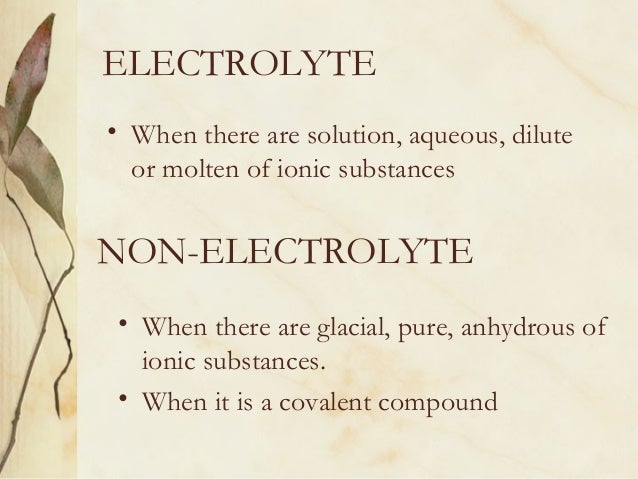
The state of being isolated kept apart or withdrawn into solitude. A nonelectrolyte is a term used in chemistry to denote a substance that does not break up or dissociate into ions when placed in solution.

2 strong acids and 3 strong base.
What is a nonelectrolyte. Updated July 03 2019. A nonelectrolyte is a substance that does not exist in an ionic form in aqueous solution. Nonelectrolytes tend to be poor electrical conductors and dont readily dissociate into ions when melted or dissolved.
Solutions of nonelectrolytes do not conduct electricity. Nonelectrolyte definition is - a substance that does not readily ionize when dissolved or melted and is a poor conductor of electricity. What is a Nonelectrolyte.
Nonelectrolytes can be defined as substances that do not have any distinct ionic form to exist in when they are dissolved in an aqueous solution. Such substances are usually poor conductors of electricity due to the fact that they do not readily dissociate into ions in their melt state or in their dissolved state. Nonĕ-lektrō-līt A substance with molecules that do not in solution dissociate to ions and therefore do not carry an electric current.
Medical Dictionary for the Health Professions and Nursing Farlex 2012. Nonelectrolyte synonyms nonelectrolyte pronunciation nonelectrolyte translation English dictionary definition of nonelectrolyte. N a substance that does not easily ionize in a solution and thus conducts electricity poorly Collins English Dictionary Complete and Unabridged 12th.
A nonelectrolyte is a term used in chemistry to denote a substance that does not break up or dissociate into ions when placed in solution. Nonelectrolytes usually consists of molecules which are covalently bonded and may or may not dissolve in water. Unlike electrolytes nonelectrolytes do not conduct electricity when in a solution.
Nonelectrolytes are compounds that do not ionize at all in solution. As a result solutions containing nonelectrolytes will not conduct electricity. Typically nonelectrolytes are primarily held together by covalent rather than ionic bonds.
A common example of a nonelectrolyte is glucose or C 6 H 12 O 6. Glucose sugar readily dissolves in water but because it does not dissociate into ions in solution it is considered a nonelectrolyte. A nonelectrolyte is a compound that does not conduct an electric current in either aqueous solution or in the molten state.
Many molecular compounds such as sugar or ethanol are nonelectrolytes. When these compounds dissolve in water they do not produce ions. Water is considered a weak electrolyte by some sources because it partly dissociates into H and OH ions but a nonelectrolyte by other sources because only a very small amount of water dissociates into ions.
If a substance doesnt ionize in water at all its a nonelectrolyte. Most carbon compounds are nonelectrolytes. Fats sugars and alcohols are largely nonelectrolytes.
Electrolyte substance that conducts electric current as a result of dissociation into positively and negatively charged particles called ions. A nonelectrolyte is a compound that does not conduct an electric current in either aqueous solution or in the molten state. Many molecular compounds such as sugar or ethanol are nonelectrolytes.
When these compounds dissolve in water they do not produce ions. Also what is the difference between an electrolyte and a Nonelectrolyte. Weak acids and weak bases are weak electrolytes.
A nonelectrolyte does not dissociate at all in solution and therefore does not produce any ions. Nonelectrolytes are typically polar covalent substances that do dissolve in water as molecules instead of ions. Sugar C12H22O11 is a good example of a nonelectrolyte.
A substance that dissolves in water to produce a liquid that electricity does not go through 2. The matter that settles to the bottom of a liquid. The state of being isolated kept apart or withdrawn into solitude.
TAKE THE QUIZ TO FIND OUT. The American Heritage Stedmans Medical Dictionary Copyright 2002 2001 1995 by Houghton Mifflin Company. Published by Houghton Mifflin Company.
A substance that dissolves in water to produce a liquid that electricity does not go through 2. Ionic and covalent compounds Members of the other class nonelectrolytes dissolve to yield solutions that do not conduct electricity. The difference between the two classes gave rise to the view that there are two types of chemical bond.
C A sucrose solution which is a nonelectrolyte contains no ions and does not conduct a current. The bulb remains unlit. Strong electrolytes are substances that are completely ionized when they are dissolved in water several classes of strong electrolytes.
2 strong acids and 3 strong base. Click to see full answer. Search the Dictionary for More Terms.
Return to top of page.